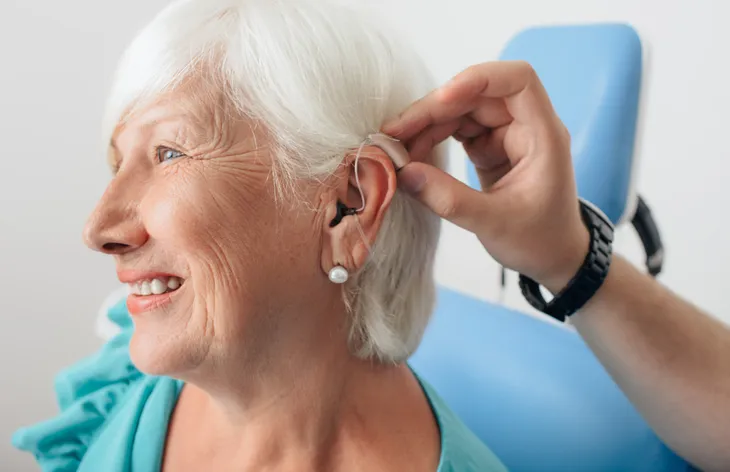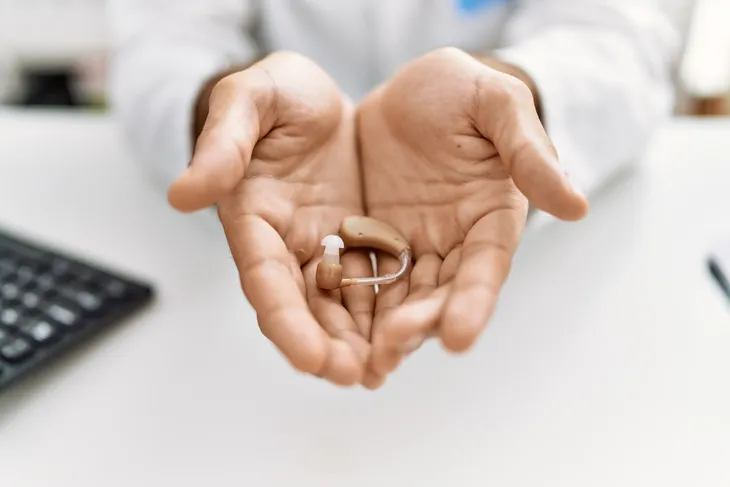U.S. retailers began selling over-the-counter hearing aids on Oct. 17, 2022, a long-awaited move that some experts predict could be a game-changer in making these devices accessible and affordable. A prescription is no longer needed, nor is a visit to a doctor or even a fitting appointment with a hearing specialist.
Instead, Americans can purchase hearing aids by going online or with a single trip to the nearest pharmacy or big-box store. These aids are only for those with mild to moderate hearing loss. For these consumers, over-the-counter hearing aids clearly offer an appealing alternative.
As an otologist/neurotologist – that’s someone who specializes in the diseases of the ear – I like to say that while vision binds us to the world, hearing binds us to each other. In my practice, I see firsthand how patients with hearing loss often withdraw socially and become isolated. They don’t want to put themselves in situations where they may mishear or seem disengaged, disinterested or unintelligent. This may be why studies show hearing loss is associated with depression and cognitive impairment.
So it seems the over-the-counter hearing aids would be a great solution for patients with hearing loss, right? Less hassle and less cost – in many cases, thousands of dollars less – and more people than ever getting the help they need. But it’s not that simple. Occurring just two months after the U.S. Food and Drug Administration’s final ruling on the matter, over-the-counter sales of hearing aids come with caveats and even some risks.
How hearing loss happens
Hearing specialists divide hearing loss into two main categories: conductive and sensorineural hearing loss. Conductive loss is caused by any number of things, including ear wax obstruction, a perforation in the ear drum or fluid in the middle ear. Children are more likely than adults to have conductive hearing loss, and most of the time, many of these problems are relatively easy to correct.
But sensorineural hearing loss is caused by a problem occurring in the inner ear, auditory nerve and brain. Most commonly, there is a loss of the tiny cochlear hair cells that convert sounds into an electrical signal. The brain interprets that signal as a bird singing or a child laughing. Hair cell injury is generally permanent and irreversible; those cells do not regenerate in humans, or for that matter, in any mammal.
Whether conductive or sensorineural, hearing aids have proved to be a tremendous boon for patients with hearing loss. One national survey found that in 2019, 7.1% of adults aged 45 and over used a hearing aid.
Problems with over-the-counter hearing aids
Before over-the-counter hearing aids became available, patients needed a formal hearing test and assessment. This is critical because not all hearing loss is the same; hearing specialists – both otolaryngologists and audiologists – are trained to decipher the type of hearing loss that a patient is experiencing. From that, they make recommendations on hearing treatment. If a patient needs a hearing aid, a health care professional will fit them with one.
But purchasing an over-the-counter hearing aid requires none of those things – not an ear exam, not a hearing test and not a fitting session. There are many reasons why this shortcut approach, while certainly less expensive and offering easier access, may not be ideal for someone experiencing hearing loss.
First, patients may have a chronic infection or condition that requires medical or surgical management, rather than a hearing aid. Second, some patients may be a candidate for surgical correction of their hearing loss. Third, patients with hearing loss in one ear or a large difference in hearing between the two ears may have a benign growth on the hearing and balance nerve. This often requires surgery or radiation treatment. Again, a hearing aid would not help with this condition.
Additionally, for those who would benefit from an over-the-counter product, not every hearing aid fits every ear – one size most certainly does not fit all. And one more caveat: Over-the-counter hearing aids are not recommended for people under 18.
Finally, some patients may have too much hearing loss for these devices to provide any benefit. Instead, many patients with more advanced hearing loss have the option of a cochlear implant, which is essentially a wire with an electrode array surgically placed into the cochlea, the bony “house” of the hair cells situated deep in the skull. The electrodes stimulate the auditory nerve directly, bypassing the damaged hair cells. For these patients, cochlear implants offer an exceptional opportunity to hear again. As the technology improves, more people will become candidates for this medical miracle.
About 80% of adults aged 55 to 74 who would benefit from a hearing aid do not use them. The new over-the-counter hearing aids hold great promise for the right patients. But buyer beware: They are not panaceas. Not all customers will be satisfied with over-the-counter hearing aids – and a visit to the doctor or audiologist is still critical.
 Peakstock / Shutterstock
Peakstock / ShutterstockBradley Kesser, Professor of Otology/Neurotology, University of Virginia
![]()
This article is republished from The Conversation under a Creative Commons license. Read the original article.




